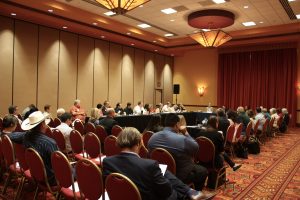The Office of Advocacy continued its efforts to hear directly from small businesses regarding federal regulations by hosting additional Regional Regulatory Reform Roundtables in Oklahoma City, Oklahoma, Phoenix, Arizona and Summerlin, Nevada, during the week of April 28, 2019. These important listening sessions are a result of the administration’s regulatory reform mandate made clear by Executive Orders 13771 and 13777, requiring federal agencies to revise and reform their existing regulations.
In order to be the voice of small businesses in this era of regulatory reform, Advocacy has been traveling across the country to learn which federal regulations are most burdensome on small businesses and reporting back to the federal agencies who are responsible for reforming those rules. Every part of the country has different concerns and varying impacts related to federal regulations, but one thing is consistently heard at every roundtable: small businesses need help and need it fast.
This most recent set of roundtables were no different. “All of these rules are burdensome and costly,” said a farmer in Oklahoma City, describing his concerns with banking, trade, transportation, and environmental regulations. “Nobody wants to protect this environment more than a farmer…but all of these regulations are preventing farmers from being able to succeed,” he continued.
Another concern heard at these most recent roundtables was the lack of sufficient labor through the Department of Labor’s H-2B work visa program. “These workers are our bloodline and our plasma. If DOL doesn’t provide the labor, we can’t get the work done,” stated a small landscaping business owner in Tulsa, Oklahoma. He suggested that DOL reinstate the three-year policy, where workers who have been brought in consistently for the past three years do not count against the H-2B caps. “Our company is only as good as the weakest link in our chain. If our business fails, there will be 35 Americans without a job,” he said.
A health practitioner in Oklahoma City complained that IRS regulations don’t keep up with changing industry practice and new ways of doing business. “The IRS code doesn’t fit within our new industry and disqualifies patients who have a health savings account,” he said. As a direct primary care clinic, they are operating a new business model that just doesn’t work under the current structure. Besides a regulatory fix to this problem, he suggested that it could be solved by passage of legislation that would redefine primary care and help patients stay healthy.

In Phoenix, Arizona, small lighting company co-owners doing business with the federal government complained of the Department of Defense’s size standards for small businesses and called for their revision. “It is nearly impossible for us little guys to compete with companies that have over 200 employees and millions in revenue,” they stated. They felt strongly that these companies are “gaming the system” and taking away legitimate small business set aside contracts from those that were meant to benefit from these rules.
A cattle farmer in Arizona gave Advocacy a heartfelt plea for relief from federal regulations he said are overburdensome for both his ranch and trucking business. The Bureau of Land Management’s Wild Horse and Burro rules as well as the Department of Transportation’s rules regarding truck insurance have left him distraught. “All I want to do is raise cattle,” he lamented. “These issues sadden me. I was raised as a small business owner when I was a child…These rules are ridiculous and a waste of money…In this country we care more about animals than people!”
Another issue brought up at the Phoenix roundtable was the many burdensome rules that have resulted from the Dodd Frank Act. A real estate broker for over 40 years in the area declared Dodd Frank as “one of the worst pieces of legislation ever.” She told Advocacy that complying with the resulting federal regulations and overwhelming loan paperwork is “almost an impossible task.”
A husband and wife in Las Vegas, Nevada, owners of numerous small retail operations, complained to Advocacy about the many labor regulations affecting their business. The minimum wage rules are of great concern to these business owners. “These rules compound the impact on us because every employee’s wage would have to go up,” they said. “The margins in retails are very small and we can’t afford these changes. Raising wages is a job killer and the result will be that payroll hours will be cut.” As a result of the increasing number of costly rules coming out of the Department of Labor, they say they will soon “have to make the decision on whether to automate their business and cut jobs or stick with people. When the regulations increase, we will hire fewer people and be forced to move towards automation.”
These and many other issues were discussed in these most recent roundtables. Small businesses continue to tell Advocacy that more work is needed in the federal regulatory reform arena and that they are extremely appreciative that someone in government has finally come to listen to their concerns.
Advocacy was in Oklahoma, Arizona, and Nevada for Regional Regulatory Reform Roundtables April 29-May 2.
Can’t get to a roundtable near you? Fill out this form and tell us about your federal regulatory burdens. We will pass this information on to the appropriate agency and use it in the planning of upcoming Regional Regulatory Reform Roundtables.
For more information on Advocacy’s mission, our regulatory reform efforts or to find out where the next Regional Regulatory Reform Roundtables will be held, please visit: https://advocacy.sba.gov/regulation/regulatory-reform/.
